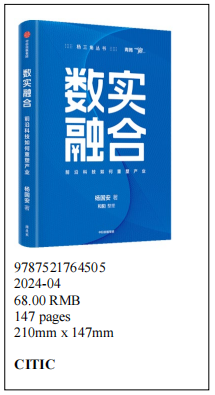
Tech-Trend, Business, Economy
《数实融合》杨国安
Digital-Real Economy Integration By Arthur Yeung
Introduction:
The rapid iteration of digital and intelligent technologies has brought new momentum to economic development while also placing higher demands on the real economy. The integration of digital-intelligent technologies with physical technologies will not only impact products and solutions but also drive a comprehensive revolution in production methods.
How can businesses find certainty in an uncertain environment? How can they harness the power of digital-physical integration to gain momentum in an era of stock economy? And how can they thrive under the broader trend of developing new quality productive forces?
Over the past few years, Professor Arthur Yeung has conducted extensive in-depth research on how digital-intelligent technologies are transforming traditional enterprises. Building on his “Five Disciplines of Digital Transformation” theory, he has refined and upgraded it to “Five Disciplines 2.0,” taking “digital-physical technology” as the logical starting point and emphasizing the driving force of cutting-edge technologies.
In this book, the author argues that in the face of the explosive growth of digital-physical technologies, companies should not limit themselves to “business model reinvention” but also focus on “industry reinvention.” Digital-physical technologies can not only help enterprises reduce costs, improve efficiency, and enhance user experience internally but also exert transformative influence at the macro-industrial level, enabling businesses to identify new positioning and breakthrough opportunities.
The book analyzes five outstanding companies—Kujiale (Cool Studio), Trina Solar, NIO, XAG, and XREAL—each excelling in different fields of digital-physical integration. Through these case studies, the author aims to help readers better understand how to apply the “Five Disciplines 2.0” framework to identify breakthroughs and carve out a unique competitive position.
About the Author:
Arthur Yeung, Senior Management Advisor at Tencent Group, Dean of Tencent’s Qingteng Business School, and Global President of Cathay Capital. He is the originator of the “Yeung’s Theory” and serves as the Chairman of the Yeung’s Entrepreneur Alliance. Yeung has contributed to teaching at international institutions such as Harvard University, the University of Michigan, and INSEAD. His expertise lies in researching the evolution of management models in the era of technological innovation, digital transformation and upgrading of traditional enterprises, organizational change in large corporations, and the globalization of Chinese businesses. In recent years, driven by his belief in technology’s power to reshape the world, he has focused on cutting-edge technological fields with profound implications for humanity’s future, exploring the prospects and possibilities of applying technology to business.
He is the author of works such as Digital and Intelligent Innovation, Organizational Innovation, The Gene of Transformation, Yeung’s Theory of Organizational Capability, Breakthrough in Organizational Capability, and Exploring the Frontiers.
Previously, he served as an editorial board member for five international journals, including Human Resource Management Journal.